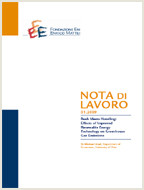Assessing SDGs: A New Methodology to Measure Sustainability

10.11.2015
Lorenza Campagnolo (Fondazione Eni Enrico Mattei, CMCC); Carlo Carraro (Università Ca’ Foscari of Venice, Fondazione Eni Enrico Mattei, CMCC); Fabio Eboli (Fondazione Eni Enrico Mattei, CMCC); Luca Farnia (Fondazione Eni Enrico Mattei, CMCC)
O44, O57, Q01
Sustainable Development Goals, Composite Index, Ranking, Indicators
Climate Change and Sustainable Development
Carlo Carraro
The FEEM project APPS – Assessment, Projections and Policy of Sustainable Development Goals – focuses on the quantitative assessment of the seventeen Sustainable Development Goals (SDGs), adopted by the United Nations at the end of September 2015. The project consists of two phases. The first, retrospective, computes indicators for all SDGs in 139 countries and then derives a composite multi-dimensional index and a worldwide ranking of current sustainability. This allows informing on strengths and weaknesses of today socio-economic development, as well as environmental criticalities, all around the world. The second phase, prospective, aims at evaluating the future trends of sustainability in the world by 2030. The assessment of the SDGs is carried out by means of an extended version of the recursive-dynamic computable general equilibrium ICES macro-economic model that includes social and environmental indicators. The final goal is to highlight future challenges left unsolved in the next 15 years of socio-economic development and to analyze costs and benefits of specific policies to support the achievement of proposed targets. This paper presents the methodology and the results of the retrospective assessment. Five main steps are described: i) screening of indicators eligible to address the UN SDGs; ii) data collection from relevant sources; iii) organization in the three pillars of sustainability (economy, society, environment); iv) normalization to a common metrics; v) aggregation of the 25 indicators in composite indices by pillars as well as in the multi-dimensional index. The final ranking summarizes countries’ sustainability performance. As expected, Middle-North European countries are at top of the ranking (Sweden, Norway and Switzerland the first three), with the most industrialized European countries such as Germany and UK, however, penalized by insufficient environmental performance. Other highly developed countries are between 24th (Canada) and 52nd place (United States). The emerging nations are scattered in our sustainability ranking. Brazil (43rd) and Russia (45th) precede China (80th) and India (102nd)
***
Suggested citation: Campagnolo, L., C. Carraro, F. Eboli, L. Farnia (2015), ‘Assessing SDGs: A New Methodology to Measure Sustainability’, Nota di Lavoro 89.2015, Milan, Italy: Fondazione Eni Enrico Mattei
